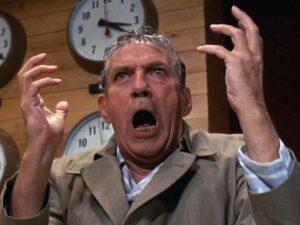Cue those spindly “rabbit ear” TV antennae. Twist the channel dial on that bulky “non flat screen” TV. We’re going back in time to the 1970s. Winner of 1977’s Oscar for Best Screenplay, Network is a movie that still holds up in 2024. Written by Paddy Chayefsky and helmed by Sidney Lumet, Network is a brilliant film that opened the world’s starry, cinematic eyes to the dangers of TV. The satirical drama packed a thoughtful punch, or should we say gunshot.
Who can forget Network actor Peter Finch’s iconic lines as TV anchorman Howard Beale, who receives his two weeks’ notice due to declining ratings. In a fit of frustration at the degenerate world he is forced to report on day in and day out, and to report it in a sensationalized, and at times unethical fashion, simply for increased viewership and ratings, he says to his TV audience in his farewell speech:
“Go to the window. Open it, and stick your head out and yell, ‘I’m as mad as hell, and I’m not going to take it anymore!”
WATCH: How To Write Great Dialogue
He implores his audience to express anger as a catalyst for positive change. Finch won a posthumous Best Actor Oscar in 1977 for his riveting performance in Network, which was his final film before passing. His powerful, multi-layered message is still part of pop culture today.
In total, Network won four Oscars – Best Screenplay for Paddy Chayefsky, Best Actor for Peter Finch, Best Actress for Faye Dunaway, and Best Supporting Actress for Beatrice Straight. Noteworthy, Straight’s Oscar win holds the record for being the “shortest onscreen performance win.” She was onscreen for little more than five minutes, and yet the lines she delivered were cogent, potent, and memorable enough to not only warrant an Oscar nom, but to garner the win. It was a true testament to skillful screenwriting, and an actor’s ability to interpret “excellent words.” On that note, let’s look deeper into the “words” of Network. What made this screenplay so powerful?
Where to Watch Network (1976): Prime Video
Plot Summary
Howard Beale is a respected, aging TV anchorman in New York City in the 1970s, and he’s given his two weeks’ notice (walking papers) due to declining ratings. Upon hearing this, he goes on TV and tells his prime-time evening news audience that he plans to commit suicide on-air the following week. This understandably causes a huge stir. But colleague and good friend Max Schumacher (played by veteran powerhouse actor William Holden) advocates for Beale. He believes that Beale should be allowed the opportunity to retract his suicide comment, to apologize, and to have a proper on-air goodbye. He is TV news royalty, after all.
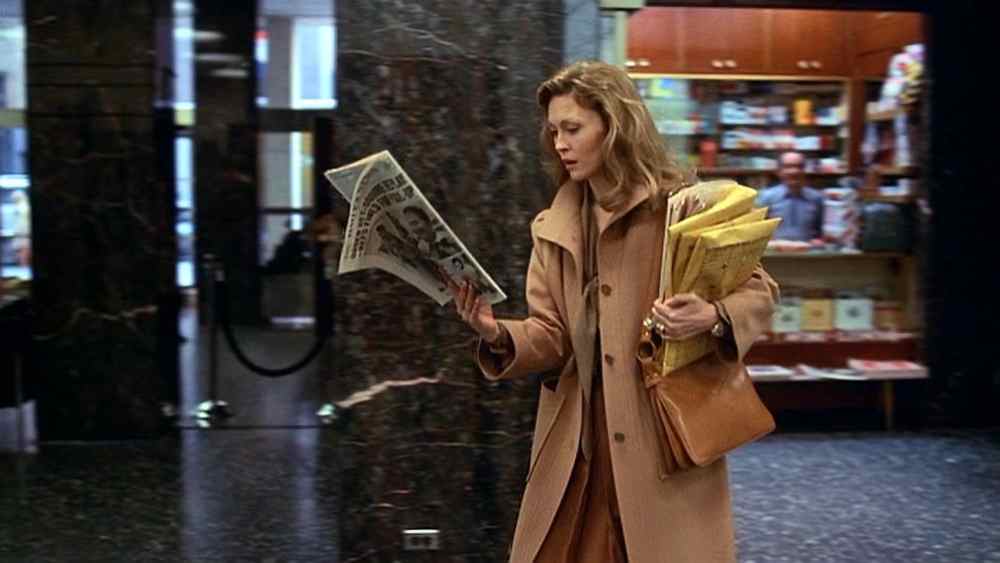
But deep sigh. Beale instead goes on TV and delivers his famous “mad as hell” speech. Ratings then surprisingly skyrocket. And so, too, does this film. Network skyrockets into the stratosphere, or if employing Howard Beale speak, “All hell breaks loose.” Enter TV Programmer Diana Christensen (played by Faye Dunaway) who is eager to exploit Beale’s downward mental spiral for TV ratings. She wants to give Beale his own TV show called The Howard Beale Show where he can “preach his gospel” about the ills of society. She says to network exec Frank Hankett (actor Robert Duvall of Godfather fame), “That dumb show jumped 5 rating points in one night…. I want that show, Frank… I can turn that show into the biggest smash on television.” Lines about highly coveted “TV viewer shares” ensue, and we movie-watchers are subsequently given a front-row seat into the chaos of a TV network, or at least this fictitious one called “UBS.”
Programmer Christensen and News Division President Schumacher also have an affair. Christensen then develops a second TV show that spotlights a terrorist group called the ELA (Ecumenical Liberation Army), branding the show as a buzzworthy docu-drama. This plot point proves important as, when Beale’s show and its depressing views on society finally run its course causing ratings to slip, Christensen and the other network execs use the ELA to assassinate Beale on-air. Yes, cue those famous voiceover final lines of Network, “This was the story of Howard Beale – the first known instance of a man who was killed because he had lousy ratings.” A big “period” punctuation mark that earned Network its grade “A+” for cinematic satire.
Characters
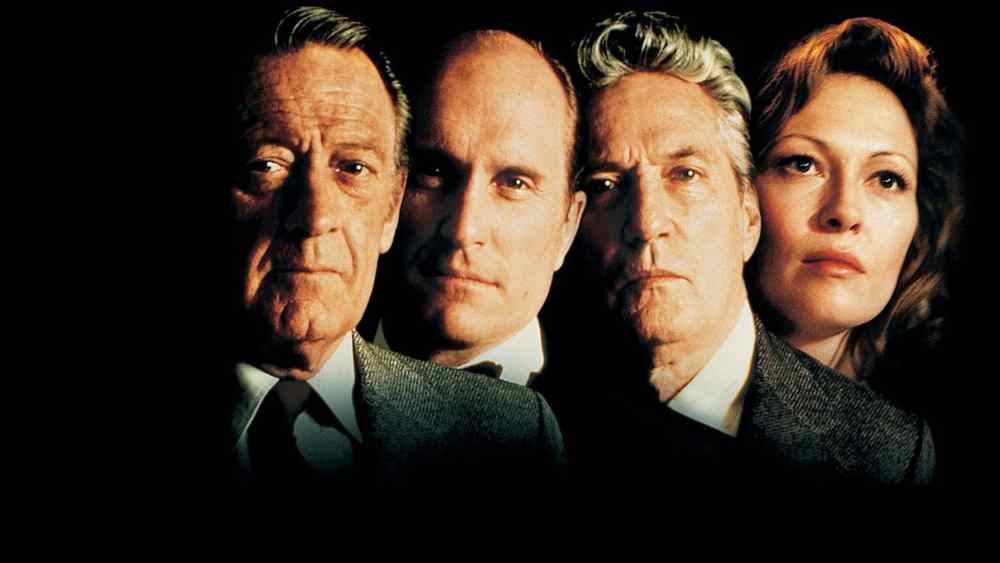
Legend has it screenwriter Chayefsky was fastidious in his character research. He took numerous trips around the USA to learn more about famous, well-respected TV news anchors such as Walter Cronkite, and the newsrooms in which they worked. He was exposed to the news anchors’ look, manner, skill, etc., and the frenetic, hungry environments in which they existed. Essentially, he was peeling back the onion to understand what made them “tick” onscreen, alongside all that went into their work offscreen.
On the flip side, he also created his own imaginary “corporate-team blueprint” for a TV network. From that jumped out the spectacular invented characters of Howard Beale, Max Schumacher, Diana Christensen, and the others. But perhaps the biggest legend of all, Howard Beale (the suicidal TV news anchorman character), was based partially on the real-life on-air suicide death of TV news reporter Christine Chubbuck back in 1974. Yes, this is a sad real-world connection. The result of Chayefsky’s extensive research is a cast of characters that feels appropriately modern and real, even in the midst of the film’s purposely “going for it” over-the-top satire sequences, notably at the film’s finale.
Themes
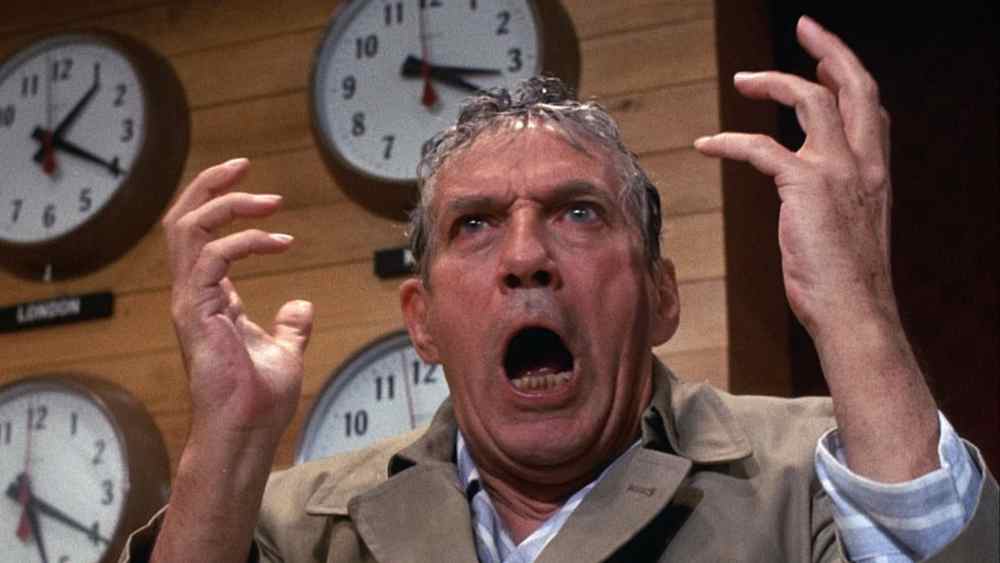
Screenwriter Aaron Sorkin, who won a Best Adapted Screenplay Oscar for 2010’s The Social Network, offers a compelling take. Since its release in 2010, the film The Social Network (which chronicles the advent of Internet social media powerhouse Facebook) has been compared to Network. They are different mediums (TV vs. Internet) and different decades (1970s vs. 2010s), but both tackle important topics related to communication, truth, ethics, and privacy. What’s more, Aaron Sorkin gave a shout-out to Paddy Chayefsky of Network in his Oscar acceptance speech.
In 2017, Sorkin received the WGAW Paddy Chayefsky Award, which honors exceptional TV writers, as Sorkin, prior to The Social Network, was known for writing the hugely successful TV show drama The West Wing (1999-2006). Sorkin has also said about Network in a New York Times interview, “If you put it in your DVD player today you’ll feel like it was written last week. The commoditization of the news and the devaluing of truth are just a part of our way of life now. You wish Chayefsky could come back to life long enough to write ‘The Internet.’”
Sorkin smartly touches on the metaphor implicit in Network’s humanistic themes. You can change the medium (aka the delivery method of information from TV to the Internet), and yet the same societal problems remain. Can we trust our information givers? Or, are the people feeding us information and algorithms actually dangerous, and in possession of ulterior motives? Further, have we become desensitized to the real human beings behind “the tube” (TV) and behind the “profile pic” (social media on the Internet)?
The film also touches on themes of alienation and disillusionment in the modern world. Beale’s famous “mad as hell” speech, while a call to action, also highlights a pervasive sense of powerlessness among individuals in the face of corporate and media giants. This sense of alienation is mirrored in the personal life of Max Schumacher, whose affair with Diana ultimately leaves him more isolated, symbolizing the personal toll of compromising one’s values for success or love.
Subtext
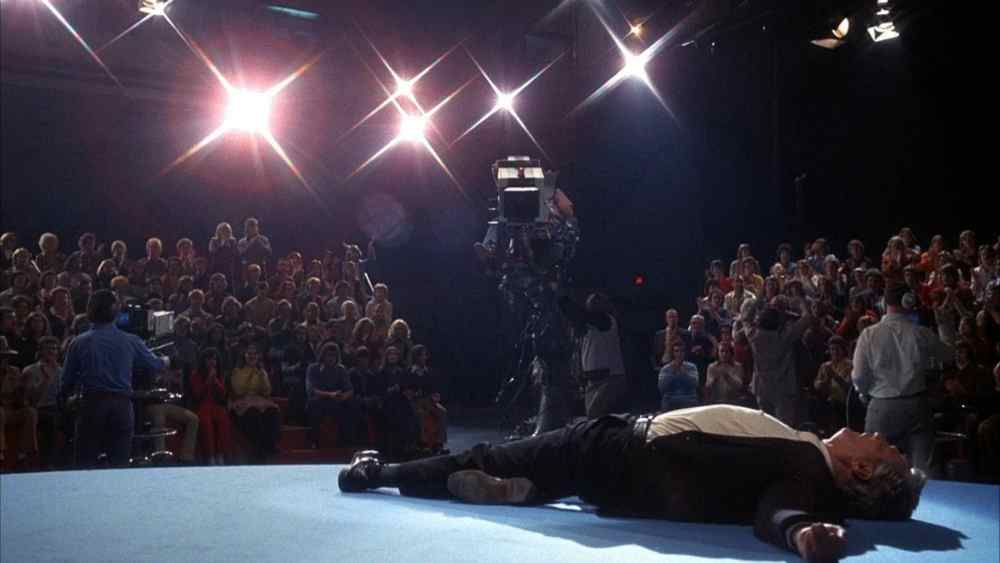
Network delves deep into the psyche of modern society, using the TV industry as a microcosm for broader societal and existential concerns. Beneath its surface narrative about the rise and fall of a television prophet, the film harbors a potent critique of the commodification of human suffering, the erosion of ethical journalism, and the insatiable appetite of the audience for sensationalism over substance.
At its heart, the film explores the dangerous intersection between corporate greed and media manipulation, suggesting that in the quest for ratings and profits, the media is willing to sacrifice integrity and humanity. This is most evident in the character of Diana Christensen, whose obsession with ratings leads her to exploit Howard Beale’s deteriorating mental health, turning his genuine anguish into a spectacle.
Besides, Howard Beale’s transformation from a respected newsman to a ranting madman is a metaphor for the decline of journalistic standards. His initial outcry against a dehumanizing society resonates with the public. And yet, as his rants become more sensationalized, the TRPs skyrocket. The irony!
Network uses its narrative to explore the consequences of a society that values ratings over reality, entertainment over ethics, and spectacle over substance. Its subtext is a profound commentary on the human condition.
Dialogues
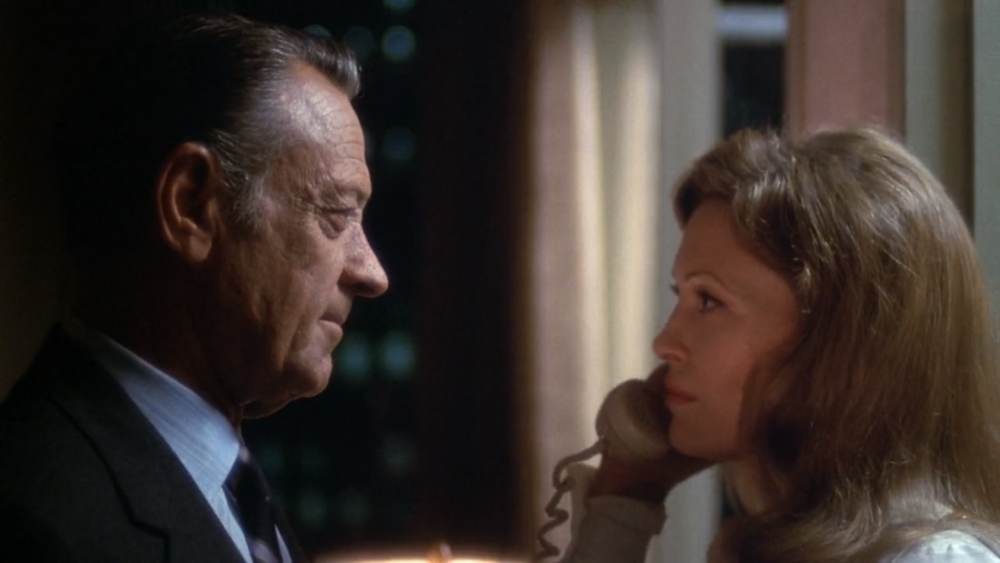
The AFI (American Film Institute) has ranked Network’s “mad as hell” speech as #19 on its list of all-time Best Movie Quotes compiled in 2007. But in addition to this whopper of a khaki-coated, disgruntled anchorman’s monologue, key dialogue scenes include the break-up between husband Max Schumacher and wife Louise Schumacher, and then the break-up between Max Schumacher and his mistress Diana Christensen.
Actress Beatrice Straight (character Louise Schumacher) is heartbreaking in delivering powerful lines such as, “This isn’t some broad that you picked up after three belts of booze. This is your great winter romance, isn’t it? Your last roar of passion before you settle into your emeritus years.” Then later, actor William Holden (Max Schumacher) is equally heartbreaking when he says to actress Faye Dunaway (Diana Christensen), “You’re television incarnate, Diana – indifferent to suffering, insensitive to joy. All of life is reduced to the common rubble of banality. War, murder, death are all the same to you as bottles of beer. And the daily business of life is a corrupt comedy.”
Similar to playwright Tennessee Williams’ 1947 play A Streetcar Named Desire, many of the lines are long and thought-provoking in Network. The characters are endowed with large chunks of dialogue, and like that play, Network has a passionate emotional magnetism that draws us in and keeps us thoroughly enthralled with these characters. In fact, their piercing words leave us craving even more.
Takeaways
Directed by Sidney Lumet, perhaps the best-known symbol of “1970s New York City film realism,” Network might’ve been a film destined for success even without a brilliant screenplay. It had a lot going for it, thanks to its highly-respected director and its super-talented cast. But Paddy Chayefsky’s screenplay indeed proved to be the magical star which, in turn, allowed all other aspects of the film to shine.
He created a sharp story that was intelligent and yet absurd, revelatory and yet unhealing. It strikingly exposed societal ills, addressed them in beautifully painful and at times comical language, and yet 47 years later, we are still deep in the belly of the beast. Chayefsky’s themes are still relevant. Some might even argue more so relevant today. No solution has been found. But for the time being, we can continue to look back, and as Aaron Sorkin commented, put that movie Network into our DVD player. Then, press “play” and simply watch. We’re assured to find worrisome “meaning” within this celluloid trip, but as respite, also some starry “entertainment.”
Where to Watch: Prime Video

